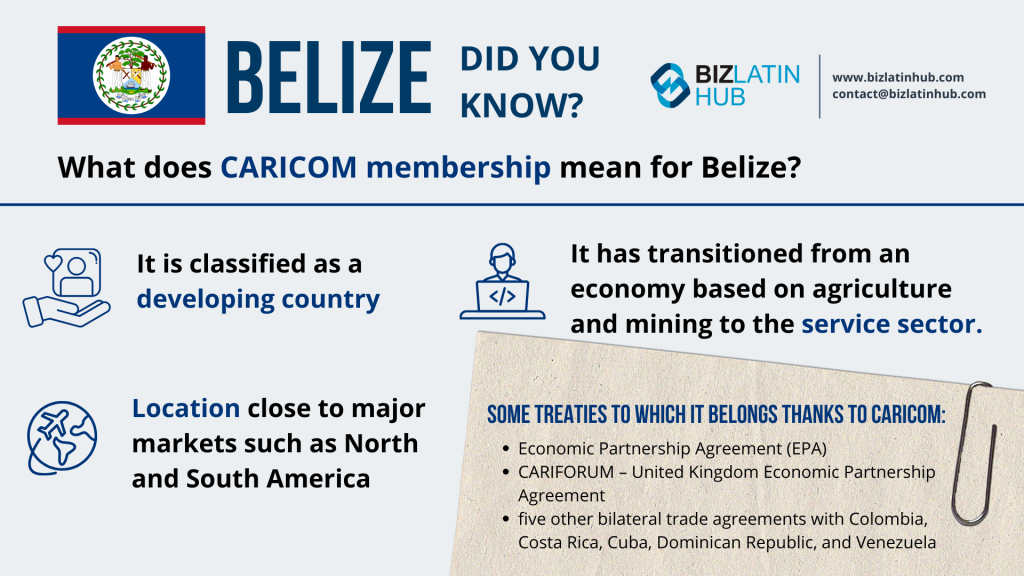Belize stands out as an attractive destination for entrepreneurs and investors looking to establish a business. Its favorable climate, strategic location, and business-friendly laws create a supportive environment for various ventures. Understanding Belize’s corporate entity options is essential for making informed business decisions.
This guide provides a comprehensive overview of corporate structures available in Belize, including International Business Companies (IBCs), Limited Liability Companies (LLCs), partnerships, and trusts. Each type of entity serves unique purposes and offers distinct benefits fitting the needs of different business models.
The guide further explores the incorporation process, tax implications, legal requirements, and confidentiality protections in Belize. By the end, readers will gain valuable insights into navigating the regulatory landscape and making the best choice for their business endeavors in this vibrant country.
Overview of Belize’s Business Environment
Belize offers a business environment based on English common law. This framework attracts international investors. The most common company type is the Business Company (BC). Other options include Limited Liability Companies (LLCs) and Public Limited Companies (PLCs).
Key Benefits of Belize’s Business Environment:
- Fast Incorporation: You can set up a company within 2-3 days.
- Minimal Reporting: Businesses are not required to prepare accounts, file annual returns, or maintain audited accounts.
- Flexibility: Belize allows redomiciliation of companies, allowing easy relocation.

Types of Business Entities in Belize:
| Entity Type | Main Feature |
|---|---|
| Business Company (BC) | Popular for international business |
| Limited Liability Company | Offers liability protection |
| Public Limited Company | Suitable for larger ventures |
Belize serves international investors with no corporate or capital gains tax. This makes it attractive for foreign investment. Companies also benefit from no stamp duties and straightforward regulatory requirements.
Business structures are simple to manage. Belizean companies must engage a registered agent. However, accounting records and financial statements are not mandatory. This easy framework supports diverse business activities and encourages foreign investment.
Types of Corporate Entities in Belize
Belize offers a variety of corporate entities to accommodate diverse business needs. These entities are popular among international investors for their flexibility, low-tax environment, and minimal regulatory requirements.
- Business Company (BC): This is the most common entity type for general business activities.
- International Business Company (IBC): Designed for offshore operations.
- Limited Liability Company (LLC): Offers liability protection and benefits from a flexible structure.
- Public Limited Company (PLC): Suitable for larger ventures with more shareholders.
International Business Companies (IBCs)
International Business Companies (IBCs) are popular for international business in Belize. Governed by the International Business Companies Act, enacted in 1990, they offer a streamlined incorporation process. Typically, you can set up an IBC within two to three days. An IBC enjoys tax exemptions on activities conducted outside Belize, making them attractive for international investors. Also, under the Belize Companies Act 2022, IBCs now follow the same regulations as local companies. They provide opportunities for asset protection and facilitate opening bank accounts.
Limited Liability Companies (LLCs)
Limited Liability Companies (LLCs) in Belize offer a blend of benefits. They provide limited liability, protecting shareholders from personal obligations. LLCs also enjoy pass-through taxation, similar to a partnership, without needing a minimum authorized capital. Belize LLCs are exempt from income, capital gains, and dividend taxes if they operate outside the country. The setup process can be completed in two to three days. Additionally, the International Limited Liability Companies Amendment Act of 2023 provides fiscal transparency, classifying them as disregarded entities or partnerships for tax purposes.
Partnerships
Partnerships in Belize involve shared business. They have two main types: General Partnerships, where partners share unlimited liability, and Limited Partnerships, offering limited liability for at least one partner. General partnerships entail equal responsibility among partners. They suit businesses that thrive on collaborative decision-making and combined expertise. Creating a partnership requires a legal agreement detailing management, profit-sharing, and dispute resolution.
Trusts
Trusts in Belize serve purposes like asset protection and estate planning. A trust involves a trustee holding assets for beneficiaries. Belize’s Trusts Act governs these entities, ensuring proper regulation. Offshore trusts must register with the Financial Services Commission (FSC) for legal status. Trusts in Belize are recognized for strong asset protection, safeguarding against third-party claims. Legislation ensures trusts remain unchanged by foreign court rulings, enhancing their reliability in disputes involving marriage, divorce, or insolvency.
The Incorporation Process in Belize
Incorporating a company in Belize is quick and efficient. Businesses can gain legal status swiftly. This process helps companies operate sooner and benefit from local advantages. Belize offers a low corporate tax rate, which increases profitability. International Business Companies (IBCs) enjoy flexibility, including no need for a Belize-resident director.
Choosing a Company Name
To register a company name in Belize, it must be unique and not confuse others. The name must reflect the business structure, such as “Limited Liability Company” or “LLC.” Certain terms, like “Bank” or “Insurance,” need proper licenses and can’t be used freely. Companies can reserve their chosen name for 90 days. A Name Check Tool helps verify name availability before registration.
Appointing Directors and Shareholders
Every Belizean company must appoint at least one director and one shareholder. These roles do not require local residency. A foreigner can fully own the company. The same person can be both director and shareholder. Corporate entities can hold these roles too. Nominee services are available for privacy, keeping real owners confidential.
Required Documentation
To form a company in Belize, a local registered address is required for documentation. However, it is not used for mail. An International Business Company (IBC) needs at least one director or shareholder, who can be an individual or a company. A Limited Liability Company (LLC) requires at least one manager and member, who can be from anywhere. Necessary documents like articles of incorporation must be filed with the Belize Companies Registry. IBCs must maintain a registered office, get a Tax Identification Number, and file an annual tax return.
Understanding the Registration Process
Registering an IBC in Belize can be completed in one day if all documents are ready. The application needs a unique company name, details on directors and shareholders, and an incorporation form outlining capital and business activities. Identification documents are required but are kept private. Belize’s computerized registry speeds up the process. There is no need for a resident director or local accounting records for IBCs, which makes managing the company easier.
Tax Implications for Businesses in Belize
Businesses in Belize encounter various tax implications based on their structure and activities. Belize Business Companies (BCs) operating within the country pay a business tax rate ranging from 1.75% to 6%. This is determined by the nature of their operations. Foreign-resident BCs are exempt from corporate taxes, emphasizing the income source’s role in tax obligations. Partnerships differ as they pass tax liabilities to partners instead of being taxed separately. As of January 1, 2020, new amendments require International Business Companies (IBCs) in Belize to adhere to updated tax obligations.
Corporate Tax Rates
The standard corporate tax rate in Belize is 25%. This rate applies to most firms active in the nation. However, sectors like tourism and agriculture may enjoy reduced rates or special incentives for growth. Belizean business companies face a nominal tax rate, while Limited Liability Companies (LLCs) are treated as pass-through entities for tax purposes. Businesses may also incur business tax and social security charges, making tax strategy essential. Offshore companies in Belize avoid value-added tax (VAT) and corporate tax, making them attractive as business entities.
Benefits of Belize’s Tax Structure
Belize offers significant advantages for businesses through its tax structure. International Business Companies (IBCs) enjoy a zero-tax environment, free from local taxes like capital gains, stamp duty, and income taxes. The 25% corporate tax rate is low compared to many other areas, attracting businesses globally. Favorable tax conditions support efficient profit distribution and retained earnings, boosting profitability. As a tax haven jurisdiction, Belize attracts businesses seeking favorable tax treatment and financial benefits. Tailored tax incentives for international enterprises further improve financial prospects for corporations in Belize.
Table: Belize Tax Structure Overview
| Entity Type | Tax Rate | Additional Info |
|---|---|---|
| BCs (Local) | 1.75% – 6% Business Tax | Varies by business activity |
| BCs (Foreign) | 0% Corporate Tax | Exempt if foreign-resident |
| Corporations | 25% Corporate Tax | Standard rate with possible sector-specific reductions |
| IBCs | 0% Local Taxes | Exempt from many local taxes, e.g., capital gains tax |
| LLCs | Pass-Through Taxation | Not taxed separately from owners |
List: Key Advantages of Belize’s Tax System
- Zero-tax environment for IBCs
- Reduction in tax for tourism and agriculture
- Low corporate tax rate at 25%
- Attractive for international investors
- Tailored tax incentives for global businesses
Legal Requirements and Compliance
All business entities in Belize must register with the Companies Registry. To do so, they must submit documentation like the Memorandum and Articles of Association. Businesses in tourism, finance, and retail must acquire specific licenses and permits before starting operations. This ensures they meet legal standards. Belize allows the formation of various business types, such as sole proprietorships, partnerships, and corporations. Each has different compliance needs. All business entities must maintain a registered office in Belize. Any changes in company structure or directors must be updated in the registry. Non-resident companies have simple requirements. They must appoint at least one director or shareholder and keep a registered agent and address in Belize.
Regulatory Framework for Corporations
Businesses in Belize must comply with the Companies Act. This act provides rules for company formation, governance, and dissolution. The Accounting Records Maintenance Act requires businesses to maintain organized accounting records. This ensures transparency and compliance with local laws. Companies must follow local and international regulations to avoid financial crimes. The Belize Companies Regulations, 2022, explain the compliance requirements for businesses in Belize. Before starting a company, thorough due diligence is necessary. This includes identity checks and risk assessments to reduce liabilities.
Accounting Obligations
Belize offshore companies do not need to file accounts, annual returns, or financial statements if they do not operate in the country. Limited Liability Companies (LLCs) must keep accounting records at their registered office or their registered agent’s office. Accounting records include financial statements, ledgers, sales slips, contracts, and invoices. They also cover documents related to the company’s assets and liabilities. Companies in Belize must meet tax obligations. They must get a Tax Identification Number and file annual tax returns if they conduct business in Belize. Belizean law requires companies to keep proper accounting records. The Belize Tax Service may audit them for compliance.
Confidentiality and Privacy Protections
Belize offers robust confidentiality and privacy protections for businesses. The country has strong laws that shield the identities of shareholders and directors in offshore company formation. Information about persons involved in a Belize LLC is kept secret and does not appear in public records. Belize only requires the filing of the Articles of Organization, which enhances privacy.
Importance of Confidentiality in Belize
Confidentiality is a key aspect of Belize’s appeal for foreign investors. The country’s laws ensure that shareholder and director identities remain private. Information about individuals associated with a Belize LLC is not disclosed publicly. The mandatory filing process is minimal, requiring only Articles of Organization with the Registry. This limits public knowledge of company details. Belize also allows the use of nominee directors and shareholders, offering an extra layer of privacy. Investors benefit from enhanced confidentiality, as the jurisdiction does not demand disclosures during company formation.
Legal Protections for Investors
Belize provides legal protections that safeguard investor interests. Members of a Belize LLC are not personally liable for the company’s debts unless stated otherwise. This protects personal assets from business liabilities. Belizean laws prevent creditors from reaching into a company’s assets to settle individual member debts, ensuring asset protection. Foreign court judgments against members or managers of a Belize LLC are not valid in Belize. This shields investors from claims outside the country. The confidentiality laws also protect LLC owners’ identities, ensuring financial privacy and reducing risk from lawsuits. Flexible business laws in Belize enable company growth and expansion, with fewer restrictions for international business activities.
Financial Considerations for Entrepreneurs
Entrepreneurs establishing an offshore company in Belize must be mindful of several financial considerations. You need to file annual tax returns and pay taxes on income earned within Belize. Taxes also apply to foreign-sourced income when you bring it into the country. Setting up a company requires compliance with legal obligations, such as annual renewals and accurate record maintenance. To manage financial responsibilities effectively, consider services like bookkeeping and compliance audits.
The Belizean offshore structure offers foreign investors a low corporate tax rate. Your business is not taxed on income from outside the country. Consulting local tax experts or attorneys is crucial. They help you understand tax implications and ensure compliance with Belizean laws.
Banking and Financial Services
Belize’s offshore banking sector is known for high data security, making it appealing for businesses seeking privacy. A stable political and economic environment adds to its reliability. Opening and managing bank accounts in Belize is straightforward. This ease benefits businesses involved in e-commerce and multi-currency transactions.
The banking infrastructure in Belize is efficient. It allows companies to conduct financial transactions smoothly. The financial services here are tailored for international business activities, especially through entities like International Business Companies (IBCs).
Currency and Investment Options
Investing in Belize can be advantageous due to its favorable conditions. The International Business Company (IBC) structure provides tax exemptions on foreign income. Despite being the smallest in Central America, Belize’s economy is stable, which attracts foreign investments.
Agriculture and services are key sectors, with tourism receiving substantial foreign direct investment. Belize’s tax policies are appealing, featuring low personal income tax rates between 0% and 25% and a VAT rate of 12.5%. Additionally, the offshore banking sector prioritizes data security, making it a secure option for investors.
Belize is a favorable destination for business structures due to its territorial tax system. This exempts foreign income from local taxation, making it ideal for offshore entities. Businesses operating in Belize must file annual returns with the Belize Companies Registry and pay a business tax. This applies to all registered entities within the jurisdiction.
Certain businesses require specific licenses from the Central Bank of Belize. For instance, money remittance and currency exchange businesses must undergo a rigorous licensing process. They need to submit extensive documentation and continuously meet reporting obligations. Proper accounting records are crucial for compliance, along with maintaining a registered office.
Overview of Regulatory Institutions
The Belize legal framework for businesses is established by several key acts. The Belize International Limited Liability Companies Act of 2011 regulates Belize LLCs. This framework is influenced by Nevis LLC law and the Cook Islands LLC Act. Companies in Belize must adhere to the Companies Act and the Accounting Records Maintenance Act.
The Belize Registrar of Companies handles the processing of legal documents. It is responsible for issuing the Certificate of Incorporation and other formalities. Moreover, Belizean legal principles are based on English common law. This impacts corporate structure and regulatory practices. Non-resident LLCs must appoint a manager or member and submit an economic substance report annually to comply with local laws.
Compliance with Local Laws
Businesses in Belize must maintain accurate financial records and be ready for audits. Each company is required to have a registered office. They must also keep proper accounting records and file annual returns with the Companies Registry. Non-resident LLCs also need at least one manager or member.
There is no legal requirement for formal meetings of members. This provides flexibility, allowing meetings anywhere. Companies not conducting business in Belize are not compelled to file annual returns or tax returns. However, they must still store accounting records at their registered office or agent. Continual adherence to these obligations ensures compliance with Belizean regulations.
List of Essential Compliance Tasks for Belize Businesses:
- Maintain a registered office.
- Keep accurate accounting records.
- File annual returns with the Companies Registry.
- Pay applicable business taxes.
- For certain businesses, acquire licenses from the Central Bank.
- Non-resident LLCs must have a manager/member and submit an economic substance report.
Table: Regulatory Requirements and Institutions
| Requirement | Institution |
|---|---|
| License for money remittance | Central Bank of Belize |
| Certificate of Incorporation | Belize Registrar of Companies |
| Filing of annual returns | Belize Companies Registry |
| Maintenance of accounting records | Companies Act and ARMA regulations |



